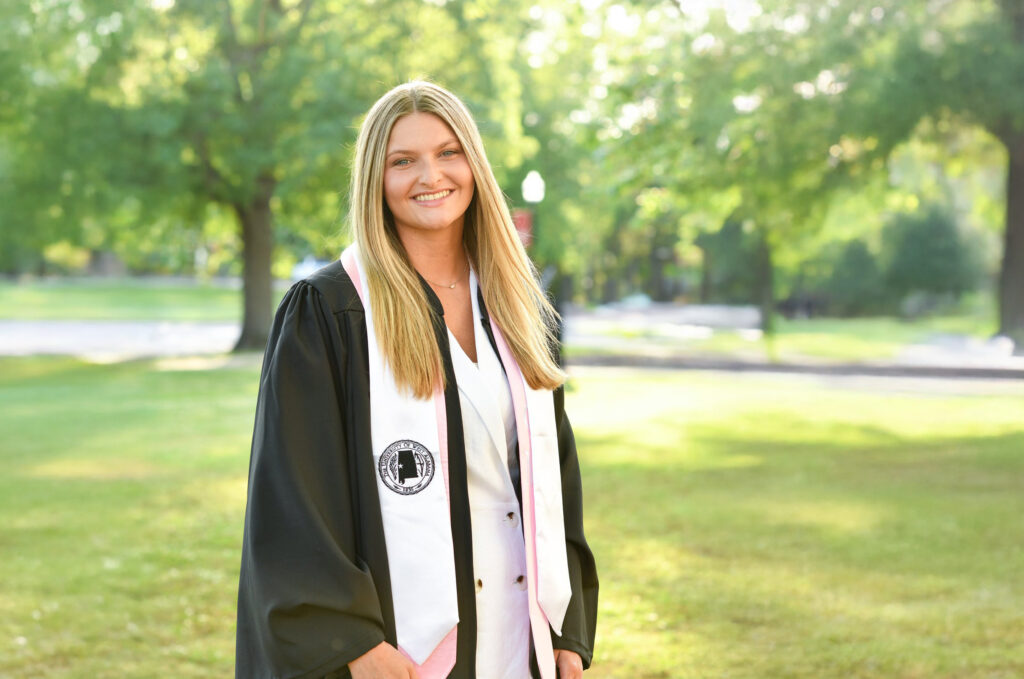
Story: Lisa Sollie
Growing up in a family rooted in science, Demopolis native Anna Kate Golden initially planned to become a nurse—but ultimately became the first in her family to pursue a career in education.
This fall, Golden will begin teaching seventh and eighth grade science at Demopolis Middle School, becoming the first graduate of the University of West Alabama’s UWA-Teach program. Funded by a $3 million grant from the Alabama Commission on Higher Education as part of the STEM Major Teacher Recruitment Initiative, UWA-Teach provides a streamlined, flexible path to teacher certification for STEM majors.
A collaboration between UWA’s College of Education and the College of Natural Science and Mathematics, the program allows students in qualifying STEM degree programs to earn a minor in STEM education. Golden graduated in May with a bachelor’s degree in biology and completed all licensure requirements, including the Educative Performance Assessment (edTPA) and the Praxis content exam.
Golden first considered teaching at the beginning of her junior year.
“I looked into changing my major, but I was crushed when I realized switching to education would add three more years to my degree,” she explains.
That’s when Hannah Millwood, master teacher for UWA-Teach, introduced Golden to the UWA-Teach program.
“When Mrs. Millwood told me that through UWA-Teach I could earn a minor in STEM education and still graduate on time,” Golden recalls, “I was all in.”
“When I met Anna Kate, I saw her passion for science, and it reminded me of myself,” Millwood says. “I’m incredibly proud of how hard she worked, especially as she navigated a brand-new program. Her students will be lucky to have her.”
Over the past two years, Golden immersed herself in learning how to teach a subject she already loved. This past spring, she completed her internship in seventh-grade science at Demopolis Middle School, working under mentor teacher Beth Lindsay.
“I really enjoyed getting to share my passion for science with my students,” Golden says. “It’s a fun subject to teach because at that age they’re naturally curious and want to know how things work.”
Golden is especially excited to return to the same school, and students, this fall.
“I’ll get to teach my former seventh graders in eighth-grade physical science, and I’ll teach life science to a new group of seventh graders. I can’t wait!”
While several factors influenced her decision to teach, Golden credits her high school science teachers at Demopolis High School, especially her biology and anatomy teacher, as her biggest inspiration.
“Mr. Parten is the main reason I’m teaching science now.”
A 2011 alumnus of UWA, Dylan Parten’s enthusiasm and ability to connect science to the real world changed the course of Golden’s life.
It’s not lost on her that she now has the chance to help her own students see the importance of science in their everyday lives.
Golden brings that vision into her classroom, using what she learned at UWA, including trips to the Dauphin Island Seal Lab and other field experiences around the state, to ignite her student’s curiosity.
“Up until now, they haven’t really been exposed to science in this way,” she notes.
One highlight of her internship was a plant dissection during a lesson on plant reproduction.
“The students loved it,” she says.
She looks forward to doing more hands-on activities this fall. One topic she can’t wait to teach is population dynamics, how plants and animals interact in an ecosystem.
“In one of my college classes, we played a card game where we were all ‘panthers,’ and we each had to grab a ‘bunny’ or another animal to eat before someone else did,” she explains. “Having my students up and moving, engaging with the material, helps them understand the concept better. It beats lecturing for an hour, and I believe they’ll retain the information more effectively too.”
Golden says student-centered learning, like the card game she plans to use, is a growing trend in STEM education. Rather than acting as the sole source of information, teachers now engage students as active participants.
“That’s what we want. We want to move away from worksheets and packets. This generation is so used to communicating through phones, they often don’t know how to talk with or work together in groups.”
During her internship, Golden encouraged collaboration and inquiry.
“Every time I taught, I’d say something like, ‘I forgot what this is, can you explain it?’ Or I’d have them break into groups to discuss and then share their thoughts with the class.”
Even if her students don’t pursue science beyond high school, she hopes they leave her class with a deeper appreciation for it.
“I want my students to talk more, help shape the dialogue, and share their opinions,” she says. “I want to be the teacher who really makes a difference, like my own high school and college professors did for me.”
That mission is at the heart of UWA-Teach.
“Their philosophy is, ‘You don’t want to be the normal teacher; you want to be the teacher that stands out,’” Golden says.
“That’s what I want to do. I want to make connections, build rapport with my students, show them things they’ve never seen before—and make my classes not just fun, but impactful. I feel so blessed to be doing this at my alma mater. It’s a place that shaped me, so being able to give back here makes it even more special.”
About UWA-Teach
UWA-Teach is also available to individuals who already hold a degree in mathematics or science and are seeking a master’s degree alongside a teaching certificate. This alternative route to certification offers a faster, more streamlined path compared to traditional Alternative-A teacher certification programs.